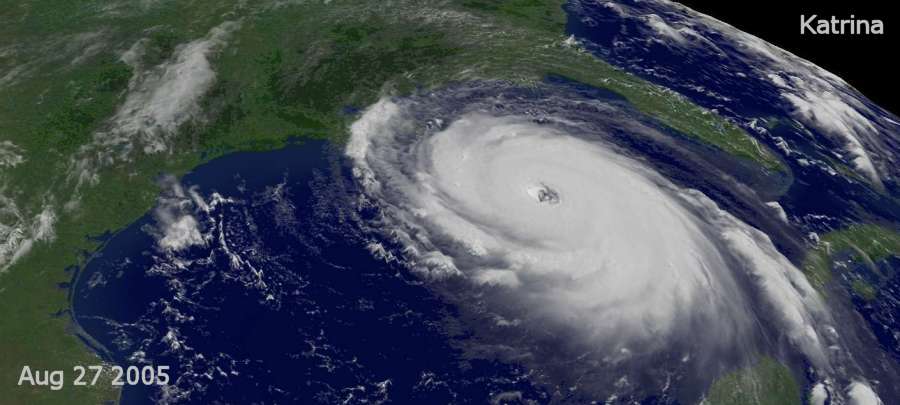|
|
|
23-12-2009
|
PDF der viser tidslinie over
ClimateGate.
The Climategate Timeline: 30 years
visualized link
|
|
22-12-2009
|
CRU Mails: Douglass og
Christy har indlæg om hvordan en af deres rapporter fra 2007 er blevet
behandlet.
A
Climatology Conspiracy?
By David H. Douglass and John R. Christy
http://www.americanthinker.com/2009/12/a_climatology_conspiracy.html
|
|
21-12-2009
|
Der ligger nu video-links
til indslagene fra den alternative klima konference 2009:
På engelsk
, på dansk
(Pielke indslag er originalt på engelsk, og Svensmark er på dansk)
Bare
lige en info hvis du skulle ønske at se Svensmarks indslag på den
alternative klima konference om kosmisk stråling.
Det er faktisk den bedste forklaring jeg endnu har set på hans
forskning.
Indslaget er på dansk og varer 30 min.
Det første indslag af Pielke er også godt, men er på engelsk originalt
(kan dog ses med dansk tolkning, hvis det ønskes).
Pielke er ikke skeptiker men forklarer klimaændringer udfra regionnale
ændringer i ”land-use” (landskabsændringer pga. menneskelig aktivitet)
Indslaget varer 40 min.
|
|
21-12-2009
|
Der foregår en kamp om at
fastsætte hvordan klimaet har været tidligere.
F.eks. er der forskere der ændrer deres egne tidligere undersøgelser:
(Huang - Boreholes) link
mm
"Huang has published papers after 1997. Tellingly the one he
published in 1998 (after Mann’s fraudulent graph came out) dropped 95%
of the data and only focused on the last 500 years. That’s one way to
get yourself included in an IPCC report isn’t it? Ignore the other 95%
of all your own work.
Huang published another in 2008 where he discounts the meaning of his
earlier work. OK. So his opinion is worth
considering. Let's consider how convincing his points are. Boreholes
are supposed to be good because they are measurements of real
temperatures rather than a “proxy”, but make no mistake, it takes a
fair bit of interpretation to say exactly how hot it was in 1066 by
digging a hole and taking the temperature a long way down. Huang had
three different reconstructions for the medieval warm period in 1997:
“a” was 0.2 degrees warmer, “b” was 0.5 degrees warmer, and “c” was 1.0
degrees warmer. Which one is more likely? How about the one closest to
all the other types of proxies out there…"
----------------------------------------------------
På
wikipedia omskrives der flittigt: (skrevet på klimadebat.dk af
N.Skjoldby)
William
Connoley, Website administrator på Wikipedia, har skrevet eller
omskrevet 5.428 artikler om klimaet på wikipedia.
Siden 2003 har han kontrolleret wikis klimaartikler om bl.a.
middelaldervarmen, men også global opvarmning, drivhuseffekt,
temperaturmålinger, UHI, klimamodeller og global afkøling:
14/2 begyndte han at fjerne "Lille Istid" og 11/8 gik han i
gang med "Middelaldervarmen" I oktober gik han igang med at
skrive om hokeystaven, ifølge denne artikkel af Lawrence Solomon:
http://www.nationalpost.com/m/blog.html?b=fullcomment&e=lawrence-solomon-wikipedia-s-climate-doctor&s=Opinion
"The Medieval Warm Period disappeared, as
did criticism of the global warming orthodoxy. With the release of the
Climategate Emails, the disappearing trick has been exposed. The
glorious Medieval Warm Period will remain in the history books, perhaps
with an asterisk to describe how a band of zealots once tried to make
it disappear."
|
|
08-12-2009
|
WattsUWT har en mucho
interessant artikel omkring temperatur korrektioner ved målestation
Darwin .
The Smoking Gun At Darwin Zero
OK … but given the scarcity
of stations in Australia, I wondered how they would find five “neighboring
stations” in 1941 …
So I looked it up. The nearest
station that covers the year 1941 is 500 km away from Darwin. Not only
is it 500 km away, it is the only station within 750 km of Darwin that
covers the 1941 time period. (It’s also a pub, Daly Waters Pub to be
exact, but hey, it’s Australia, good on ya.)
So there simply aren’t five stations to make a “reference series” out
of to check the 1936-1941 drop at Darwin.
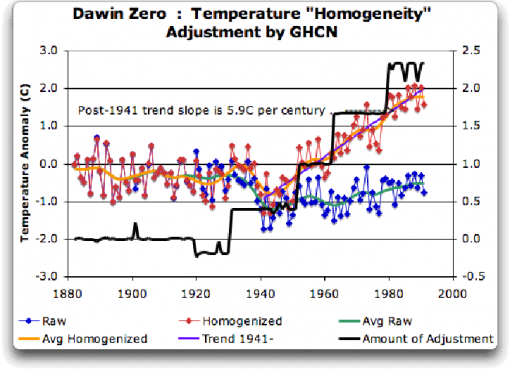
We have five
different records covering Darwin from 1941 on. They all agree almost
exactly. Why adjust them at all? They’ve just added a huge artificial
totally imaginary trend to the last half of the raw data! Now it looks
like the IPCC diagram in Figure 1, all right … but a six degree per
century trend? And in the shape of a regular stepped pyramid climbing
to heaven? What’s up with that?
|
|
07-12-2009
|
Jon stewart on climategate
Rex Murphy CBS
|
|
30-11-2009
|
Jorden kan absorbere meget
mere kuldioxid, end man hidtil har troet, viser ny undersøgelse. Norske
eksperter er uenige i, hvor meget vi egentlig ved om kulstofkredsløbet.
Videnskab.dk
WorldClimateReport
|
|
25-11-2009
|
Climatic Research Unit (UK) hacket. Det
har afsløret en masse korrespondance der tyder på at der fifles
gevaldigt for at bevare billedet af den "aldrig tidligere sete
voldsomme menneskeskabte (CO2) globale opvarmning" .
Climategate: the final nail
in the coffin of 'Anthropogenic Global Warming'?
Hvis citater som dette er korrekt, er
det slemt:
One of the alleged
emails has a gentle gloat over the death in 2004 of John L Daly (one of
the first climate change sceptics, founder of the Still Waiting For Greenhouse site), commenting:
“In an odd way this
is cheering news.”
Kilder: CBS WattsUp ClimateDepot BBC KLIMADEBAT.DK Telegraph UK
Der
er lavet en søge side der kan søge i disse email : her
Nu
er der så også fundet samme manipulation i andre lande: New
Zealand
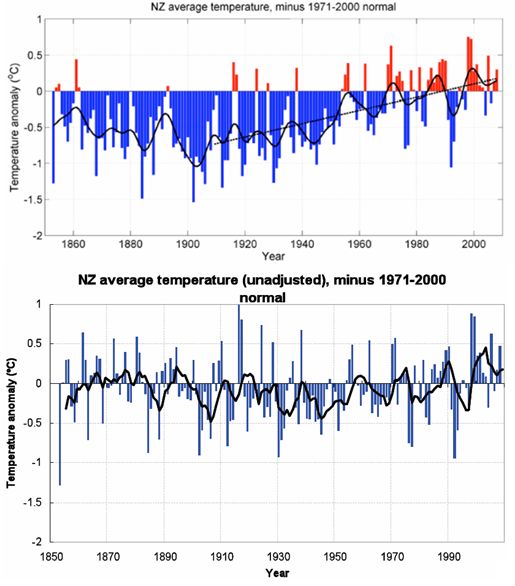
Video kommentar, Tim
Ball
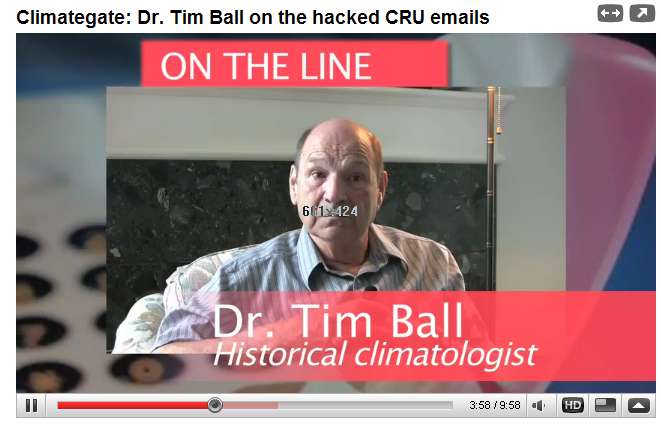
Kilde mm. er uklar men her er angiveligt Uddrag fra mails:
I've just
completed Mike's Nature trick of adding in the real temps to each
series for the last 20 years (ie from 1981
onwards) amd from
1961 for Keith's to hide the decline.
The fact is that we
can’t account for the lack of warming at the moment and it is a
travesty that we can’t. The CERES data published in the August BAMS 09
supplement on 2008 shows there should be even more warming: but the
data are surely wrong. Our observing system is inadequate.
So, if we could
reduce the ocean blip by, say, 0.15 degC,
then this would be significant for the global mean — butwe'd still have to explain the land blip.
I've chosen 0.15 here deliberately. This still leaves an ocean blip,
and i think one needs to have some form of
ocean blip to explain the land blip (via either some common forcing, or
ocean forcing land, or vice versa, or all of
these). When you look at other blips, the land blips are 1.5 to 2 times
(roughly) the ocean blips — higher sensitivity
plus thermal inertia effects. My 0.15 adjustment leaves things
consistent with this, so you can see where I am coming from.
Removing ENSO does not affect this.
|
|
15-11-2009
|
Dokumentar fra Finsk fjersyn
med McIntyre, Lindzen mfl..
link
(med engelske undertitler på den finske tale)
"The video showing the climate research
work of Dr. Richard Lindzen of MIT and Steven
McIntyre of Climate Audit is now up on YouTube. One of the most
compelling portions of the program has to do with the erroneous
reversal of the Tiljander sediments, and Dr.
Michael Mann’s stubborn refusal to acknowledge his error, even though
other authors of peer reviewed papers have done so. In my opinion,
salvation of the hockey stick seems to trump the salvation of good science
practice."
|
|
21-10-2009
|
Sattellit målinger peger på,
afkøling ligesom visse modeller:
"Analysis of the satellite data shows a
statistically significant cooling trend for the past 12 to 13
years"
link link
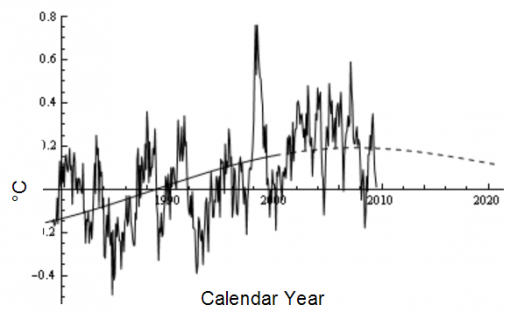
|
|
21-10-2009
|
Middelalder varme og Lille
Istid bekræftet i nyt canadisk studie:
"Both chironomid-based
August air temperature inferences and sedimentological assemblages
suggest that Southampton Island was affected by a regional warming
between cal yr AD
1160–1360 and a regional cooling between cal yr AD 1360–1700." link
|
|
29-08-2009
|
Solens klima rolle nærmere klarlagt i ny forskning: (Science)
"Small fluctuations in solar activity, large influence on the
climate "...
"It blows away the IPCC and CCSP arguments that the sun is a bit
player in climate compared to CO2"...
"...the radiation intensity within one sun spot cycle varies by
just 0.1 per cent. Complex interplay mechanisms in the stratosphere and
the troposphere, however, create measurable changes in the water
temperature of the Pacific and in precipitation"
Rapport
Space.com
Science-Editorial
|
|
20-06-2009
|
Australsk senator undersøger
beviserne for menneskeskabt global opvarminig. Møde mellem alarmister
og skeptikere.
Mange gode points i den debat:
http://joannenova.com.au/2009/06/19/the-wong-fielding-meeting-on-global-warming/
Senator Fielding holds a crucial vote on the proposed Emissions
Trading Legislation. Fielding and four independent scientists
faced the Minister for the Climate Change and Water, Penny Wong, The Chief Scientist, Penny Sackett, and Professor Will Steffan, director of the Climate Change Institute at
the Australian National University. Read what happened from someone who
was there.
Se også "No Evidence Paper" .
|
|
22-05-2009
|
Frank Lansner med artikel omkring de historiske global
temperaturer, set udfra et virvar af proxies.
Website
pdf
|
|
11-05-2009
|
Isen i Arktis tykkere end
forventet !!
Lawrence
Solomon: Thick Arctic ice surprises scientific expedition - link
|
|
11-05-2009
|
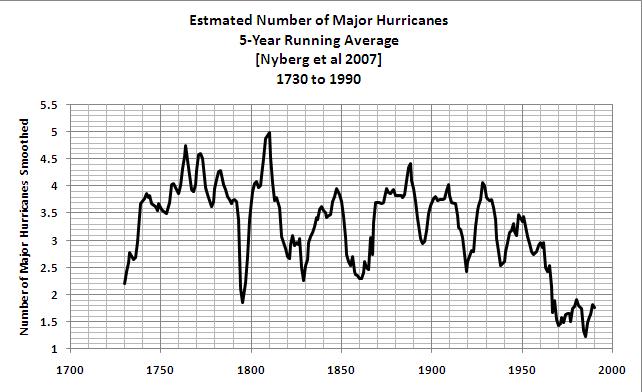
Temperaturer
i Arktis 1880-2004 :
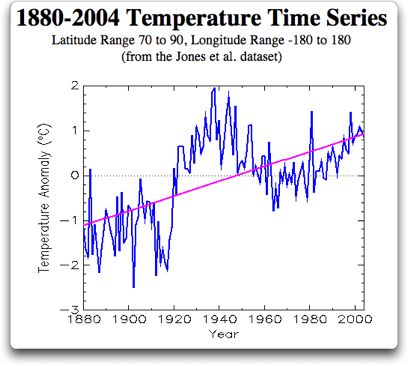
|
|
20-04-2009
|
On March 25th, Christopher Monckton gave testimony
before the US House Committee on Energy and Commerce.
"The trend in global mean surface
temperatures since the satellite temperature data and global
CO2 concentration data became available in 1980, if it were
extrapolated as far as 2100 (Figure
9), would fall considerably short of the IPCC’s official
predictions"
|
|
20-04-2009
|
Isen på Antarktis forøges ...
"Ice
core drilling in the fast ice off Australia's Davis Station in East
Antarctica by the Antarctic Climate and Ecosystems Co-Operative
Research Centre shows that last year, the ice had a maximum thickness
of 1.89m, its densest in 10 years.
The average thickness of the ice at Davis since the 1950s is 1.67m.
A paper to be published soon by the British Antarctic Survey in the
journal Geophysical Research Letters is expected to confirm that over
the past 30 years, the area of sea ice around the continent has expanded.
"
TheAustralian
South.Hem.Sea
ice
|
|
|

|
|
26-03-2009
|
Hvor kommer den øgede CO2
fra ? Nyt studie
vækker undren.
Artikel
‘Sources and Sinks of Carbon Dioxide’, by Tom Quirk, Energy and
Environment, Volume 20, pages 103-119.
(Tom Quirk has a Master of Science from the University of
Melbourne and Master of Arts and Doctor of Philosophy from the
University of Oxford. His early career was spent in the UK and USA as
an experimental research physicist, a University Lecturer and Fellow of
three Oxford Colleges. )
...The analysis of 14C in atmospheric CO2
showed that it took some years for exchanges of CO2 between the
hemispheres before the 14C was uniformly distributed…
“If 75% of CO2 from fossil fuel is emitted north of latitude 30 then
some time lag might be expected due to the sharp year-to-year
variations in the estimated amounts left in the atmosphere. A simple
model, following the example of the 14Cdata with a one
year mixing time, would suggest a delay of 6 months for CO2
changes in concentration in the Northern Hemisphere to appear in the
Southern Hemisphere.
“A correlation plot of …year on year differences of monthly
measurements at Mauna Loa against those at the South Pole [shows]… the
time difference is positive when the South Pole data leads the Mauna
Loa data. Any negative bias (asymmetry in the plot) would indicate a
delayed arrival of CO2 in the Southern Hemisphere.
“There does not appear to be any time difference between the
hemispheres. This suggests that the annual increases [in atmospheric
carbon dioxide] may be coming from a global or equatorial source.”
Mere om CO2
(Carbon Dioxide Information Analysis Center)
|
|
16-03-2009
|
More Than 700 International Scientists
Dissent Over Man-Made Global Warming Claims
Outpouring of Skeptical Scientists Continues as 59 Scientists Added to
Senate Report
News flash
Report
“I am a skeptic…Global warming has become a
new religion.” -
Nobel Prize Winner for Physics, Ivar Giaever.
“Since I am no longer affiliated with any
organization nor receiving any funding, I can speak quite frankly….As a scientist I remain skeptical...The main basis
of the claim that man’s release of greenhouse gases is the cause of the
warming is based almost entirely upon climate models. We all know the
frailty of models concerning the air-surface
system.” -
Atmospheric Scientist Dr. Joanne Simpson,
the first woman in the world to receive a PhD in meteorology, and
formerly of NASA, who has authored more than 190
studies and has been called “among the most preeminent scientists of
the last 100 years.”
|
|
02-03-2009
|
“7 Mutually Contradictory Things about Climate
Change” (fra kommentarer til denne artikel)
Contradiction #1:
IPCC projects global warming at a rate of 0.2C per decade in the early
21st century; so far the first 8 years of the
21st century have shown cooling at an average rate of around 0.1C per
decade. Oops!
Contradiction #2:
IPCC states that the rate of sea level rise has increased in the latter
part of the 20th century, switching from tide gauge records to
satellite altimetry; the tide gauge record shows a slight decrease in
sea level rise in the second half of the 20th century, as compared to
the first half. Hmm.
Contradiction #3:
IPCC states that changes in solar irradiance since 1750 are estimated
to cause a radiative forcing of only 0.12 W/m2, equivalent to a net
warming of around 0.02C; several studies by solar scientists conclude
that the 20th century warming caused by the unusually high level of
solar activity is around 0.35C. Ouch!
Contradiction #4:
IPCC states that the warmth of the last half century is unusual in at
least the previous 1,300 years, ignoring overwhelming physical and
historical evidence of a warmer global Medieval Warm Period. Huh?
Contradiction #5:
IPCC claims that the satellite temperature record has shown a faster
rate of tropospheric warming than that at the surface, confirming the
anthropogenic cause of warming; both the satellite and radiosonde
record show less warming than the surface record. Oops!
Contradiction #6:
IPCC models all assume a strongly positive feedback from clouds with
warming, resulting in 1.3C of the total assumed 2xCO2 climate
sensitivity of 3.2C; actual physical observations show a strongly
negative net feedback from clouds of around the same order of
magnitude; correcting the 2xCO2 climate sensitivity for this factor
brings it to around 0.6 to 0.8C, rather than 3.2C. Ouch!
Contradiction #7:
IPCC states confidently that the upward distortion of the surface
temperature record due to the urban heat island effect has a negligible
influence of less than 0.006C per decade; many studies from all over
the world show that the UHI influence is thirty to fifty times as great
as claimed by IPCC. Oh, oh!
|
|
02-03-2009
|
Global Warming and Climate Change in
Perspective: Truths and Myths About Carbon Dioxide, Scientific
Consensus, and Climate Models
by William Happer (February 28, 2009)
Before the U.S. Senate Environment and
Public Works Committee
|
|
21-11-2008
|
Global Warming as a Natural Response to Cloud
Changes Associated with the Pacific Decadal Oscillation (PDO)
Rapport af
Spencer. Forord
mm.
"November 9, 2008:
The two
papers we had submitted to Geophysical Research Letters have both been
rejected, with instructions to not resubmit either one. The first paper
showed how none of 18 IPCC climate models, in over 1,000 years of
global warming simulations, ever exhibits the negative feedback we have
measured from global satellite data.
The second
paper revealed new satellite evidence that the Pacific Decadal Oscillation
modulates the Earth's radiative balance by an amount that, when put
into a simple climate model, can explain 75% of global warming over the
20th Century....including the slight cooling between 1940 and 1980.
"
|
|
10-10-2008
|
Analyse af atmosfære
temperaturer viser IKKE fingeraftryk fra CO2 påvirkning. Det tyder på
at CO2 IKKE er nogen primær driver af temperatur påvirkninger.
Endvidere peger analysen på at overflade målinger er dårlige til at
påvise drivhus effekt.
link
|
|
26-07-2008
|
NASA's temperaturkurver
under kritik.
link
|
|
10-03-2008
|
Beregning af CO2 følsomhed,
altså hvad bevirker en fordobling af CO2 af temperatur stigning.
link
|
|
10-03-2008
|
Klima konference i New York,
se blog .
link
|
|
10-03-2008
|
Ny teori om fysikken bag
drivhus effekten.
link
|
|
17-12-2007
|
John Christy med nye
interessante vinkler på temperatur udviklingen mm.
The last 25 years
constitute a period of more complete and accurate observations and more
realistic modelling efforts. Yet the models are seen to disagree
with the observations. We suggest, therefore, that projections of
future climate based on these models be viewed with much caution."
http://icecap.us/images/uploads/DOUGLASPAPER.pdf
Climate scientists at the University of Rochester, the University of
Alabama, and the University of Virginia report that observed patterns
of temperature changes (‘fingerprints’) over the last thirty years are
not in accord with what greenhouse models predict and can better be
explained by natural factors, such as solar variability."
citat:
Co-author John Christy said: “Satellite data and independent balloon
data agree that atmospheric warming trends do not exceed those of the
surface. Greenhouse models, on the other hand, demand that atmospheric
trend values be 2-3 times greater. We have good reason, therefore, to
believe that current climate models greatly overestimate the effects
of greenhouse gases. Satellite observations suggest that GH models
ignore negative feedbacks, produced by clouds and by water vapor, that
diminish the warming effects of carbon dioxide.”
Rapport fra marts 2007 omhandlende et studie af temperaturer i
Californien fra 1910-2006, hvor der sammenlignes nymæssigt område med
landligt område .
http://www.nsstc.uah.edu/atmos/christy/ChristyJR_07EC_subEAQ_written.pdf
"indicate that changes since 1910 are more consistent with the
impacts of land-use changes than the effects currently expected from
the enhanced greenhouse theory"
|
|
17-09-2007
|
Professor udfordrer Al Gore
i at forudsige temperatur trends 10 år frem.
"The
Global Warming Challenge
• Claims have been made that the Earth will warm rapidly.
• These are not based on scientific forecasting methods. Thus, the
challenge:
Predict global mean temp over 10 years.
- Al Gore selects any current climate model
- Scott Armstrong will assume no change
Each deposits $10,000 in a trust fund in Dec.
2007. Value to winner’s charity in 2018. "
Armstrongs "Forecast" kritik:
http://ff.org/images/stories/sciencecenter/armstrong_presentation.pdf
http://theclimatebet.com/
|
|
17-08-2007
|
Kritikken (Lockwood and Frohlich (2007)) af bla. Svensmark tilbagevises,
solteorien harmonerer måske stadig med de observerede
temperaturer her
We have documented five
serious scientific problems in Lockwood and Frohlich (2007):
1. The authors’ smoothed TSI dataset depends
unduly upon the start and end dates.
2. A source dataset inconsistent with other such datasets in the
literature was selected.
3. Correlations between changes in solar activity and in temperature
are omitted.
4. The data on cosmic-ray forcing demonstrate the opposite of the
authors’ conclusion.
5. Data on the amount of solar radiation reaching the Earth’s surface
are omitted.
|
|
10-08-2007
|
Ny beregning af de
historiske temperaturer i USA viser overraskelser, her.
"1998 falls to #2 behind 1934
as the warmest year, followed by 1998, 1921, 2006, 1931, 1999 and 1953.
Don’t expect any press releases from NASA or NOAA about this change nor
much coverage on the networks or major newspapers "
|
|
10-07-2007
|
Kritik af Svensmarks
teorier, omtale i Ingenøren ,
se også debat ifm. artiklen.
Flere links om dette: 1
|
|
05-04-2007
|
Weekendavisen med omtale af filmen "The Great Climate
Swindle".
De personer der citeres i filmen er:
Professor
Ian Clark, Department of Earth Sciences fra Ottawa Universitet,
professor og oceanograf Carl Wunsch fra MIT (Massachusetts Institute
Technology), professor Philip Stott, Department of Biogeography fra
London Universitet, professor Richard Lindzen fra MIT, professor
Synn-Ichi Akasofu, leder af International Arctic Research Centre,
klimatologen Tim Ball fra Winnipeg Universitet, John Christy,
Department of Atmospheric Science fra Alabama Universitet og en af
IPCC-rapportens hovedforfattere, Roy Spencer, Weather Satellite Team
Leader, NASA, professor Patrick Michaels, Department of Environmental
Sciences fra Virginia Universitet samt Nigel Calder, tidligere redaktør
på New Scientist, og klimatologen Piers Corbyn.
|
|
02-04-2007
|
CO2 og menneskeskabt global
opvarmning ? Nej, sådan er det ikke lige når man læser denne analyse
af Zbigniew Jaworowski, M.D., Ph.D., D.Sc., senior advisor at the
Central Laboratory for Radiological Protection in Warsaw.
Jeg har samlet figurerne (10) fra denne artikel på denne side.
...more than 90,000
direct measurements of CO2 in the atmosphere, ...between
1812 and 1961, with excellent chemical methods (accuracy
better than 3%), were arbitrarily rejected. ...The only reason
for rejection was that these measurements did not fit the hypothesis of
anthropogenic climatic warming. I regard this as perhaps the greatest
scientific scandal of our time.
|
|
12-03-2007
|
Engelsk
video med tankevækkende vinkler og fakta omkring global opvarmning.
I videoen er der interview med bla. John Christy(1
2 ), og Eigil
Friis Christensen . Berlingske har omtale her .
Artikel
der opsummerer filmens indhold .
Se den istedet for Al Gore's kampagne film .
|
|
08-03-2007
|
Mere om Svensmarks
teori:
|
|
08-02-2007
|
Artikel i Ingeniøren om
kritik af IPCC rapport her
. Fraser Institute og kritik her .
• Data collected by weather satellites since
1979 continue to exhibit little evidence of atmospheric warming, with
estimated trends ranging from nearly zero to the low end of past IPCC
forecasts. There is no significant warming in the tropical troposphere
(the lowest portion of the Earth’s atmosphere), which accounts for half
the world’s atmosphere, despite model predictions that warming should
be amplified there.
• There is no compelling evidence that dangerous or unprecedented
changes are underway. Perceptions of increased extreme weather events
are potentially due to increased reporting. There is too little data to
reliably confirm these perceptions.
• There is no globally-consistent pattern in long-term precipitation
trends, snow-covered area, or snow depth. Arctic sea ice thickness
showed an abrupt loss prior to the 1990s, and the loss stopped shortly
thereafter. There is insufficient data to conclude that there are any
trends in Antarctic sea ice thickness.
• Natural climatic variability is now believed to be substantially
larger than previously estimated, as is the uncertainty associated with
historical temperature reconstructions.
• Attributing an observed climate change to a specific cause like
greenhouse gas emissions is not formally possible, and therefore relies
on computer model simulations. These attribution studies do not take into account the basic uncertainty about
climate models, or all potentially important influences like aerosols,
solar activity, and land use changes.
• Computer models project a range of future forecasts, which are
inherently uncertain for the coming century, especially at the regional
level. It is not possible to say which, if any, of today’s climate
models are reliable for climate prediction and forecasting.
|
|
03-02-2007
|
Interview i Weekendavisen
med lektor Jørgen Peder Steffensen , se uddrag her .
"»Når
vi taler om, at temperaturen ligger fem-seks grader over normalen i
hele Nordeuropa, så er det ikke et tegn på den globale
temperaturstigning, for den ligger nede på en tiendedel grad over en
række år.«"
"VOLDSOMME
udslag i klimaet er historisk set ikke enestående. Under den sidste
istid på den nordlige halvkugle skete der 26 gange ekstreme ændringer i
temperaturen over en meget kort periode uden nogen åbenlys naturlig
forklaring.
»Det, vi kan se af iskerneboringerne, er, at der på den linie af lange
perioder med istid ligger en masse piskesmæld i klimaet, som er meget
hurtigere. Det er meget bratte og voldsomme klimaforandringer inden for
en menneskealder. Vi har iskernedata, der viser, at temperaturen på
Grønland i disse piskesmæld steg med 14 grader i gennemsnit inden for
25 år."
|
|
27-01-2007
|
Program
på BBC Radio4, hvor der kigges kritisk på Stern rapporten.
Simon
Cox looks at the debate over global warming in this country. In October
2006, the Government published The Stern Review on the economics of
climate change. But is
the report worth the acclaim it got?
|
|
20-01-2007
|
Link til DR P1 hvor man kan
høre en udsendelse om den
nyeste klimaforskning. Medvirkende: Fysiker Henrik Svensmark,
Danmarks Rumcenter; Meteorolog Jens Hesselbjerg Christensen, Danmarks
Meteorologiske Institut; Geofysiker Jørgen Peder Steffensen, Niels Bohr
Institutet.
Udsendelsen trækker meget godt op hvor klimadebatten står lige nu.
Bemærk du skal tillade pop-up's fra dr.dk for at kunne høre udsendelsen
.
|
|
17-01-2006
|
Dansk side med klimadebat www.klimadebat.dk
|
|
21-12-2006
|
Weekendavisen med nyt om orkaner
|
|
14-12-2006
|
Oversigt over vigtigste
globale klima hændelser 2006 her
Hele siden her
|
|
14-12-2006
|
Genfundet et link hvor
John Christy sammenfatter klimaforskning og global opvarmning .
(fra 2000) . John Christy,
Professor of Atmospheric Science and Director of the Earth
System Science Center at the University of Alabama
"A universal feature of climate model projections of global
average temperature changes due to enhanced greenhouse gasses is a rise
in the temperature of the atmosphere from the surface to 30,000 feet.
This
temperature rise itself is projected to be significant at the
surface, with increasing magnitude as one rises
through this layer called the troposphere. Most people use the term
Global Warming to describe this
temperature rise."
"The model experiments included some major processes, but not all
major processes.
When those additional processes are also factored in, such as real
El Ni±os, the climate models do not produce
the observed global average vertical temperature changes observed since
1979. In other words, the temperature of 60% of the atmosphere
appears to be going in a direction not
predicted by models. That, in my view, is a significant missing piece
of the climate puzzle which introduces considerable uncertainty about a
model's predictive utility."
"Has hot weather occurred before in the
US? All time record high temperatures by
states begin in 1888. Only eleven of the states have uniquely seen
record highs since 1950 (35 occurred prior to 1950, 4 states had
records occurring both before and after 1950.)"
Interessant
om dette har ændret sig siden 2000 ? Må vist lige undersøge det .
Link til liste over temperatur rekorder i USA
|
|
11-12-2006
|
En skeptiker blog, der
meget godt opsummerer de kritikpunkter der stadig er aktuelle ift. den
"etablerede konsensus". Nigel Lawson (Warwick
Hughes website) .
|
|
11-11-2006
|
New York Times med en rigtig
fornuftig artikel omkring debatten om CO2 niveauer . Her
Grafik over CO2 udvikling
her
De originale grafer
her og her
"The Phanerozoic dispute, ..., has
occurred in isolation from the public debate on global warming. Al Gore
in “An Inconvenient Truth” makes no mention of it. "
|
|
26-10-2006
|
Canada Free Press med
artikel om dansk forskning her
.... mere her.
De har også kritik af klima debatten og Gore's propagandafilm her .
"That
is, cloud cover changes over a 5-year period can have 85 percent of the
temperature effect on the Earth that has been claimed to have been
caused by nearly 200 years of manmade carbon dioxide emissions. The
temperature effects of cloud cover during the 20th century could be as
much as 7 times greater than the alleged temperature effect of 200 years worth of additional carbon dioxide and
several times greater than that of all additional greenhouse gases
combined."
|
|
21-10-2006
|
Pressemeddelelse fra British
Antarctic Survey her
Deres hovedside .
En anden interesant artikel omkring hvordan ismasser fungerer fra Journal of
Glaciology .
|
|
01-10-2006
|
Artikel fra Nature
om diverse klima emner i en global sammenhæng. Af Gabrielle Walker.
Den aktuelle mængde drivhusgasser
vil med garanti resultere i en
fortsat opvarmning i de kommende årtier, og verdensøkonomiens aktuelle
struktur sikrer, at der i
dette tidsrum vil ske en stadig forøgelse af mængden af den slags
gasser. Spørgsmålet er, hvad man vil gøre ved det, og hvor hurtigt man
vil gøre noget.
|
|
11-08-2006
|
Hvad sker der med
klimadiskussionen ? JENS
OLAF PEPKE PEDERSEN
Seniorforsker Center for Sol-Klima Forskning, læs mere
|
|
31-07-2006
|
Weekendavisen skriver: Danske
forskeres hypotese om, at solens varierende aktivitet spiller en vigtig
rolle for de globale klimaforandringer understøttes nu
eksperimentelt, se uddrag her .
"Hvis hypotesen er rigtig, betyder det, at vi i dag ikke ved, om
den temperaturstigning på omkring 0,6 grader, der er observeret igennem
det sidste århundrede, er menneskeskabt ved afbrænding af kul, olie og
gas, som det antages af FNs internationale klimapanel, eller om et
væsentligt, måske endda dominerende bidrag kommer fra solen."
"Eftersom
klimamodellerne overhovedet ikke inddrager solens indvirkning på
jordens skydække, betyder det, at de hidtidige klimamodeller ikke kan
bruges til at lave de forudsigelser, som de bruges til at lave. Det er
problematisk, at man politisk har et videnskabeligt set ufuldstændigt
grundlag for klimapolitikken,« mener Henrik Svensmark."
"...
at der en halv snes gange er forekommet tilsvarende kolde perioder
inden for de sidste ca. 10.000 år, hvor temperaturen i Nordatlanten er
gået op og ned cirka 2 graders celsius, hvad der i virkeligheden er
enorme udsving. Det er der endnu ingen af klimamodellerne, der kan
forklare, og før de kan det, er deres fremskrivninger af fremtidige
klimaændringer højst usikre,« mener Jasper Kirkby. "
"Jasper
Kirkby: »Er hypotesen om sol-kosmisk-stråling-skyer rigtig, betyder
det, at klimamodellerne, der forsøger at fremskrive udviklingen i
klimaet frem til år 2100, er ufuldstændige, fordi de ikke har solens og
de kosmiske strålers påvirkning af skydannelsen. Skydannelsen vil
foregå anderledes, end man hidtil har troet. Skyerne er i så fald ikke
bare et resultat af klimaet – som antaget i klimamodellerne – men er
med til at skabe klimaet. Det er måske ikke overraskende for
atmosfærefysikere, eftersom det i det internationale klimapanel IPCCs
seneste statusrapport fra 2001 hed, at »mekanismerne, der forstærker
solens påvirkning af klimaet, ikke er velforstået.« ...
... man kan ikke lave overbevisende projektioner af den
fremtidige opvarmning som forårsaget af menneskeskabte drivhusgasser,
før man har inddraget alle de naturlige klimatiske ændringer og
forklaret ændringer igennem de sidste få tusind år, som er
sammenlignelige med det sidste århundredes klimaændringer .
|
13-01-2006
Nye klimafakta fra is-borekerner gør livet svært for klimamodellerne, se her
17-12-2005 Nyt fra US Climate
Change Science Program (CCSP). Temperature
Trends in the Lower Atmosphere
17-12-2005 År 2005 hidtil
varmeste år
JP
08-12-2005 Forskning peger på
mulig svækkelse af Goldfstrømmen ? NY
Times
25-11-2005 Nye målinger af CO2
gennem de sidste 650.000 år, NY Times
17-10-2005 Ny fokus på målinger der
ligger til grund for påstanden om global opvarmning.
17-10-2005 Weekendavisen om
jordens tidligere kolde perioder
.
10-09-2005 Weekendavisen om Orkaner som Katrina
28-05-2005 Lars Oxfeldt
Mortensen skriver i Weekendavisen om klima "præsteskabet"
her
24-05-2005 Havet styrer
istidens klima, DMI artikel
, Stærkeste stråling fra Solen i 50 år DMI
artikel
05-05-2005 Videnskabsfolk
advarer mod Kyoto
og CO2
(På sitet kan der downloades udsendelse der uddyber kritikken).
10-04-2005 Weekendavisen om ny
teori omkring kobling mellem vanddamp
og CO2 .
01-03-2005 Weekendavisen om Mann . Og om CO2 og kosmisk stråling
18-02-2005 Breaking news :
Forskere slår fast: Mennesket står
bag drivhuseffekten pol mere
11-02-2004 Tyske Stern om
Crichton bog om øko angst mm her
04-02-2005
Fremtrædende orkanforsker kritiserer
det interstatslige klimapanel IPCC for politisering. (WA artikel)
Mere debat her
Mere kritik af Mann-kurve (Hockey Stick) her Den omtalte
DMI side her
02-02-2005 Ekstrabladet med historie
og kilden her
Temperatur data fra Antarktis: Novolazarevskaya
station , Bellingshausen
station
Oversigt over temperatur trends på Antarktis her
Sea level trends her
(2000)
02-02-2005 Guardian om skeptisk
konference
Guardian om olielobby
15-01-2005 British
Antarctic Survey - Opsummering
"It is thus not possible to say definitively whether Antarctica as a
whole is warming or cooling."
"...there is no evidence for a decline in overall Antarctic
sea ice extent"
06-12-2004 New York Times
artikel om klima på Nordpolen (boringer) her
04-12-2004 DR program,
"Dommedag aflyst" beskrivelse her
John Christy (som medvirker i uds.) afgav vidneforklaring for
U.S. House of Representatives' Committee her
03-12-2004 Artikel om
isborekerner på Grønland (NorthGRIP) mm her
NGRIP hjemmeside
Pressemedd. sept. 2004 her
Atikel fra Nature sept. 2004 her
Atikel
fra Nature jun 2004 her
20-11-2004 Grønland temperatur
kurver her
12-11-2004 ACIA rapport, kritik
fra danske glaciologer her
12-11-2004 Satellit
målinger af atmosfæren, irriterende konstante her
rapport
16-10-2004 DMI artikel om
1000 års klima og Hockey-Stick her (edit: 2018-08-10: via ”way back machine”: 2018 copy)
20-05-2004 Ny diskussion om
beregning af sattellit temperaturerer her
20-05-2004 Opvarmning af Arktis
? Ja, -50 er varmt her
08-09-2003 Institut for
Miljøvurdering, rapport om vejr ekstremer her
13-08-2003 Forskning i
havis (DMI) her
07-08-2003 Mere
Landscheidt fakta om solen her
31-07-2003 Så er Politiken på
sporet af en klima sag, Global opvarmning som
masseødelæggelses våben.
11-04-2003 20.århundrede ikke
så varmt !! Harvard-Smithsonian
Center for Astrophysics
18-02-2003 NASA sattellit
målinger - årsopgørelse
+ Richard Lindzen artikel omkring termperatur
målinger mm. (PDF)
12-02-2003 Artikel i
Politiken17-08-2002 omhandlende forskning i is-borekerner.
27-12-2002 Artikel i
WeekendAvisen om Kosmiske stråler.
Billede af solplet
Tidligere
artikler fra Weekend Avisen Juli 2000 / November 2000...
23-07-2002
Artikel
omkring solcykler og klima
|


